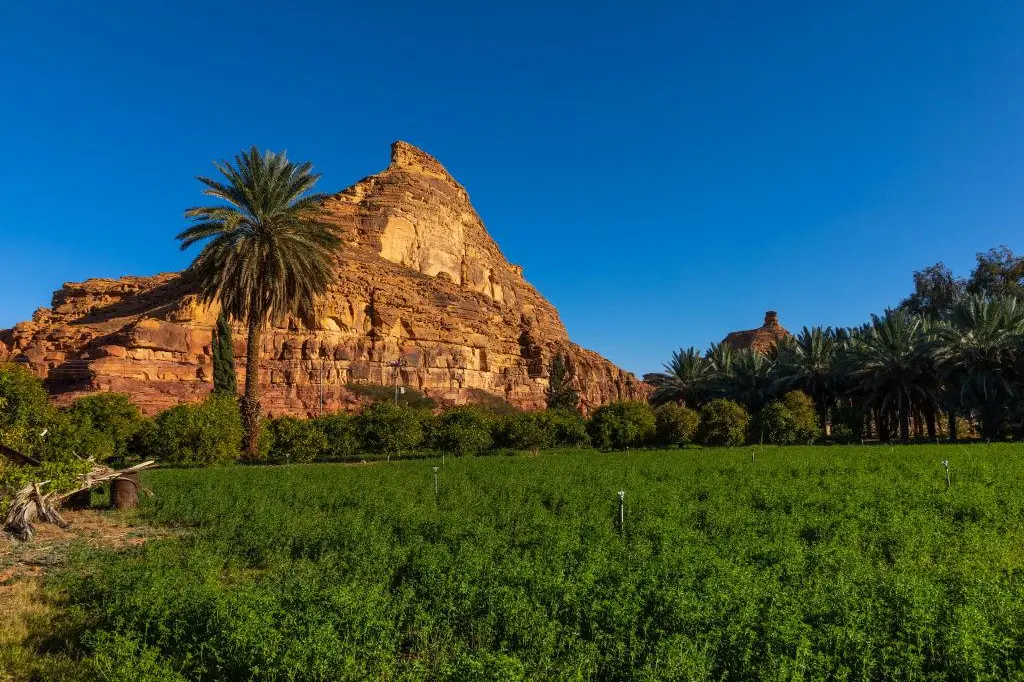PHOTO
The Kingdom’s push to plant large swathes of forest and vegetation is part of its pledge to tackle carbon emissions.
On Thursday, the National Center for Vegetation Cover inked a memorandum of understanding with the Saudi Investment Recycling Co. to plant more trees in its facilities and cooperate on the implementation of the company’s afforestation projects.
Under the terms of the agreement, the center will provide support and guidance on afforestation, irrigation methods, water sources, the suitability of proposed sites to plant appropriate species, as well as identifying suitable plants for each region and the right time to plant them.
The center will also offer help with research and study programs related to afforestation.
Corporations, government bodies, and research centers throughout Saudi Arabia have been involved in launching a number of community-based afforestation schemes in response to an initiative led by Crown Prince Mohammed bin Salman to turn the desert green and rehabilitate 40 million hectares of land over the coming decades.
Separately, on Thursday, the Imam Abdulaziz bin Mohammed Royal Reserve Development Authority used drones to scatter acacia, wild sidr, clover, lavender, and psyllium seeds, among others.
And to celebrate the annual Oct. 14 Arab Environment Day, it also carried out a cleanup campaign in and around the Rawdat Khuraim Nature Reserve. The event took place in cooperation with the Environmental Green Horizons Society and with the participation of various government authorities.
The initiative aims to raise public awareness through environmental activities and events and promote volunteering.
In addition, it helps students to understand the importance of protecting the environment and increasing vegetation cover, while highlighting the environmental damage caused by waste, and the need for sustainability and social responsibility.
Saudi Arabia’s afforestation campaign has been given a boost with the signing of a deal to plant trees.
The Kingdom’s push to plant large swathes of forest and vegetation is part of its pledge to tackle carbon emissions.
On Thursday, the National Center for Vegetation Cover inked a memorandum of understanding with the Saudi Investment Recycling Co. to plant more trees in its facilities and cooperate on the implementation of the company’s afforestation projects.
Under the terms of the agreement, the center will provide support and guidance on afforestation, irrigation methods, water sources, the suitability of proposed sites to plant appropriate species, as well as identifying suitable plants for each region and the right time to plant them.
The center will also offer help with research and study programs related to afforestation.
Corporations, government bodies, and research centers throughout Saudi Arabia have been involved in launching a number of community-based afforestation schemes in response to an initiative led by Crown Prince Mohammed bin Salman to turn the desert green and rehabilitate 40 million hectares of land over the coming decades.
Separately, on Thursday, the Imam Abdulaziz bin Mohammed Royal Reserve Development Authority used drones to scatter acacia, wild sidr, clover, lavender, and psyllium seeds, among others.
And to celebrate the annual Oct. 14 Arab Environment Day, it also carried out a cleanup campaign in and around the Rawdat Khuraim Nature Reserve. The event took place in cooperation with the Environmental Green Horizons Society and with the participation of various government authorities.
The initiative aims to raise public awareness through environmental activities and events and promote volunteering.
In addition, it helps students to understand the importance of protecting the environment and increasing vegetation cover, while highlighting the environmental damage caused by waste, and the need for sustainability and social responsibility.
Copyright: Arab News © 2021 All rights reserved. Provided by SyndiGate Media Inc. (Syndigate.info).





















